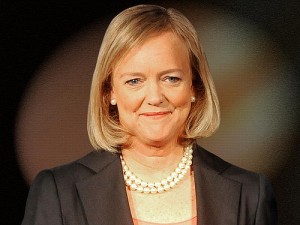 HP chief executive Meg Whitman has reaffirmed the company’s commitment to its PC business, and has promised that HP’s newly created Printers and Personal Systems (PPS) division will get “more than its fair share” of R&D investment in the coming years.
HP chief executive Meg Whitman has reaffirmed the company’s commitment to its PC business, and has promised that HP’s newly created Printers and Personal Systems (PPS) division will get “more than its fair share” of R&D investment in the coming years.
During a surprise appearance at the Global Influencer Summit 2012 in Shanghai today, Whitman said that, as the world becomes more digital, HP’s PC and printing franchises continue to increase in importance.
“PCs are a part of how we create and access digital information,” she said. “We’ve found that we can differentiate our products through design and innovation. As the only player with leadership positions in both the consumer and the enterprise markets, we can bridge that gap that is being created by the consumerisation of IT.”
Whitman’s message contrasts starkly with the company’s plans just nine months ago, when former CEO Leo Apotheker announced that HP was spinning off its PC business in favour of software and services. At the time it was said that PCs were the lowest-margin business in HP, but analysts warned that getting rid of its PC division could hurt HP’s server business, because the company depends on high-volume supply relationships with component makers.
After taking the reins at HP in September 2011, Whitman swiftly reversed the decision to spin off the PC business, following a strategic review that indicated PCs were a “key component of HP’s efforts to create long-term relationships with consumers”. The division has since been merged with HP’s printer group to form the PPS unit.
“We did an analysis that indicated very strongly that PCs are an essential part of Hewlett Packard, that there are tremendous upsides in the business for us, that there are tremendous supply chain advantages across all our different product lines, so quite quickly we made the decision to keep our PC business and, in fact, invest in it,” she said.
HP produced some evidence of its R&D efforts at the summit with a presentation by John Apostolopoulos, director of the Mobile and Immersive Experience Lab at HP Labs.
In particular, Apostolopoulos highlighted a circuit element developed by HP called memristor, which the company believes can revolutionise storage and help extend battery life. A memristor is a “resistor with memory” that sits alongside a resistor, capacitor and inductor in a circuit, and has the potential to replace storage in smartphones, tablets, notebooks and servers.
HP is currently working with memory manufacturer Hynix to commercialise memristor, and Apostolopoulos said the first products were expected to arrive in 2014-15.
Apostolopoulos also talked about HP’s research into plastic flexible displays, which can be used to make current mobile devices thinner and lighter, create affordable curved screens for PCs, and even build wearable personal devices.
These displays will be used in HP’s future “cloud-connected personal devices,” some of which the company hopes to integrate with the Aurasma augmented reality engine that HP gained as part of its acquisition of Autonomy last year.
But in spite of HP’s mobile research focus, and its marketing push around the consumerisation of IT, there is very little evidence that HP has progressed with its plans to launch smartphones and tablets since discontinuing operations for webOS devices last year.
When questioned on this point during a Q&A session at the summit, Todd Bradley, executive vice-president of HP’s PPS group, hinted that forthcoming HP tablets would run Windows 8 and be aimed at the enterprise. However, no time scale was given for the development of such devices.
“Our tablet strategy is around partnering with Microsoft and bringing a Windows 8 tablet into the marketplace,” he said. “When we announce the roadmap of tablets you will find a very compelling solution that the tablet becomes a part of.
“I’m very comfortable with where we’re going with tablets. I know we will have a very competitive product with probably more of an enterprise and small business focus than a consumer focus,” he added.
Meanwhile, Whitman reiterated that HP is “first and foremost a hardware company,” and that the company plans to build on its strengths in servers, storage, networking, PCs and printing.
“We are in the software business, but we are not in the software business to transform HP into a software company. We’re in the software business to solve some of our customers’ toughest problems,” she said.





